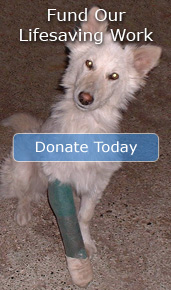Eating Animals
AAS's policy on eating animals is that it is
not animal welfare to eat animals or any of their parts.
When are all the people who
say they love animals going to stop eating them because only when that
happens will most of the cruelty and suffering of animals at the hands of
humans end.
Aside from the flat
contradiction of eating what you say you love, there is the matter of the
terrible suffering the animals endure before being eaten. Many people who
say they love animals have pets who they treat like royalty. Then they eat
the animals that aren't 'theirs'. Some even use these horribly suffering
animals to raise funds for their rescued animals - those lucky few that won
one of life's cruel lotteries by being rescued. The body parts of suffering
animals are cooked and served at their fund-raisers. The ethical
contradiction fairly screams out loud, but these organizations seem to be
deaf.
The most bizarre example we know of is the
bird rescue organization which served chicken at one of its fundraisers.
As long as members of the animal welfare movement are still eating
animals, there is little chance of ending most animal suffering.
The largest, most powerful, most
authoritative animal welfare organization in BC, the BC SPCA, went on
serving animal parts at its fundraisers even after the massive negative p.r.
that resulted from one branch raising money by
boiling crabs alive. Has it
stopped serving any animal parts at fundraisers now? Many searches of
the BC SPCA website hasn't found a
'policies' section.
We have copies of the SPCA's old policies
and hope one day to be able to read any new policies.
Abolition:
AAS was asked: "You call for abolition, why
don't you be the first? You post and talk about it, why not do it yourselves
as a group? By rescuing and keeping animals yourself, you are contributing
to the suffering, you have to feed those animals, keep them captive so why
not lead the way?"
Anyone can find that AAS has been preaching
abolition for years. A search of the current AAS WatchDog messageboard for the word
"abolition" yields six posts, and a search of the archived posts yields
forty-seven more.
As for AAS being "first", Judy
Stone, founder says, " I am ashamed to admit
that I am late-comer to the comprehension that true animal protection and
welfare can only be achieved through the abolition of the right to enslave
other sentient beings. Far more intelligent persons than I realized it
hundreds, even thousands of years ago. I only joined the abolition movement
about ten years ago, pre-internet, when I began telling friends that I
realized that the cruelty I saw wasn't ever going to end as long as animals
were legal property. Nor as long as there is a multi-million dollar slave
rescue/welfare/protection industry. That industry is largely kept in
business by donations from millions of animal-lovers who have not been told
that their donations will not end the cruelty that has wrung their
hearts and wallets. Only abolition can end cruelty.
"There is no contradiction in being a
contentious objector to war and succoring the war-wounded. That is all I am
doing by bandaging the bleeding heads of the wounded and giving sanctuary to
as many as I can, personally and with helpers. Ministering to the
war-wounded does not make a person a willing combatant.
"Typically, slavery is defended by
slave-owners who point to all the "happy", well looked-after slaves. Even
some of the slaves themselves feel more comfortable in the familiarity of
slavery. I recently listened to a CBC radio show about the capture of
children in Africa for the camel-racing industry. The riders are as young
as four years old. They are almost starved to keep them light. They are
awarded with food for winning and beaten if they lose. The child being
interviewed had been rescued by a child-slave rescue Society. He had been
returned to his original family, yet he yearned to return to his
camel-racing "family"; the family that he had become accustomed to.
"I know that some dogs that have lived on a
chain most of their lives, sometimes abused, sometimes even beaten, yearn at
first to return to the familiarity of their chains. That they do does
not justify the chains. That they become happier on the benign chains that
I provide, does not justify my benign slavery. It's all slavery. I
have written many times that it was the good slave-owners who impeded the
end of the idea that human slavery is acceptable no matter how benign it
is.
"Just as good human slave-owners justified
owning humans, every good animal-owner and every happy pet justifies owning
animals. That benign slavery of animals is morally wrong, is the
intellectual hurdle that every animal lover must leap. When enough people
make that leap, only then will the law say that animals cannot be owned by
humans.
Next: Rehoming: Rescue:
[ return to "About AAS" main page ]





